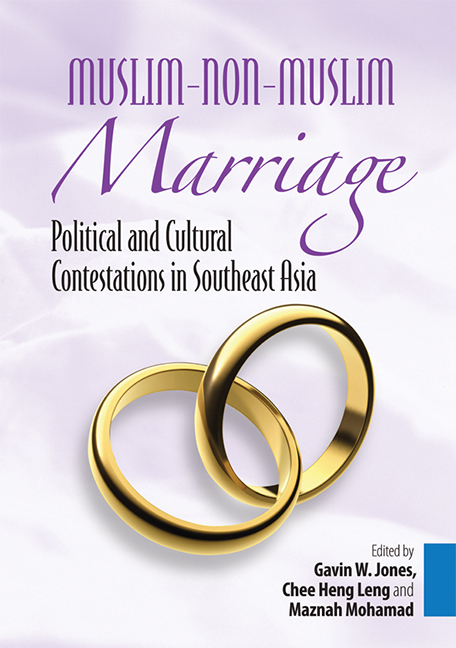Book contents
- Frontmatter
- Contents
- Preface
- The Contributors
- Glossary
- Introduction
- SECTION I Political and Legal Contestations
- Chapter 2 Trapped between Legal Unification and Pluralism: The Indonesian Supreme Court's Decision on Interfaith Marriage
- Chapter 3 Private Lives, Public Contention: Muslim-non-Muslim Family Disputes in Malaysia
- Chapter 4 Legal Aspects of Muslim-non-Muslim Marriage in Indonesia
- Chapter 5 The Politico-Religious Contestation: Hardening of the Islamic Law on Muslim-non-Muslim Marriage in Indonesia
- SECTION II Lived Realities
- SECTION III Perspectives
- Index
Chapter 3 - Private Lives, Public Contention: Muslim-non-Muslim Family Disputes in Malaysia
from SECTION I - Political and Legal Contestations
Published online by Cambridge University Press: 21 October 2015
- Frontmatter
- Contents
- Preface
- The Contributors
- Glossary
- Introduction
- SECTION I Political and Legal Contestations
- Chapter 2 Trapped between Legal Unification and Pluralism: The Indonesian Supreme Court's Decision on Interfaith Marriage
- Chapter 3 Private Lives, Public Contention: Muslim-non-Muslim Family Disputes in Malaysia
- Chapter 4 Legal Aspects of Muslim-non-Muslim Marriage in Indonesia
- Chapter 5 The Politico-Religious Contestation: Hardening of the Islamic Law on Muslim-non-Muslim Marriage in Indonesia
- SECTION II Lived Realities
- SECTION III Perspectives
- Index
Summary
INTRODUCTION
Conventionally, ethnic riots or recurrent violence are often used as distinct markers of ethnic conflicts in society. However, the prevalence of ethnic tensions can also be evidenced by other processes, such as the inability of legal institutions to resolve everyday conflicts involving family relationships. In Malaysia, this has become an important manifestation of emerging ethnic divides. Recent disputes involving interreligious relationships or Muslim-non-Muslim marriages, as in the Lina Joy, Shamala, and Subashini cases, have brought forth issues of legal significance with enormous political implications. The contentious nature of these cases is being dictated by a larger contest to control and influence reforms within both Islamic and civil law.
The force behind the Islamization movement is not solely provided by the Islamic political opposition, but also by a rising, urban-based Islamic civil society. The latter is driven by a newly-emergent Malay-Muslim middle-class, comprising scholars, professionals, and political activists who are able to mobilize and lobby effectively for Islamic dominance in all aspects of governance, the law being one of the most important institutions of control. This process has posed various problems, not least because it is being waged within a multicultural context, with about 45 per cent of the Malaysian population being non-Muslims.
The impetus to Islamize various branches of society may be read positively by its proponents — as a project to re-capture the indigenous elements of history once lost to colonial domination (Horowitz 1994). However, this is not always achievable without grave social costs, one of which is its impact on race relations. As the Malaysian legal system moves closer towards accommodating syariah, the laws, policies, and regulations which emanate from this process have influenced the resolution of interreligious family concerns and disputes. Many of these regulations unequivocally limit the boundaries of interethnic relationships. Together with an unrelenting social movement to carve out an exclusive framework of governance for Muslims, the evolving judicial trend has been extremely divisive.
This chapter documents some of the Muslim-non-Muslim cases which have been subjected to the above contestation. It describes the conflict which has arisen between those who advocate Islamic legal predominance in the system on the one hand, and those who rally behind the Constitution against such a dominance on the other. In this environment it is difficult for the judicial system to resolve interreligious family disputes.
- Type
- Chapter
- Information
- Muslim-Non-Muslim MarriagePolitical and Cultural Contestations in Southeast Asia, pp. 59 - 101Publisher: ISEAS–Yusof Ishak InstitutePrint publication year: 2009



